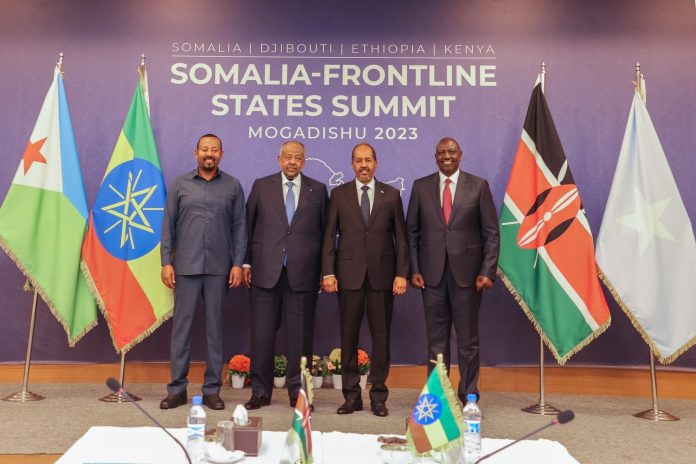On Wednesday, Somalia conducted a defence forum with its neighbouring countries in order to coordinate a multi-national attack on Al Shabaab.
The conference was chaired by Somali President Hassan Sheikh Mohamud and attended by Djiboutian President Ismael Omar Guelleh, Kenyan President William Ruto, and Ethiopian Prime Minister Abiy Ahmed.
Despite heavy security around Somalia’s capital, four mortar bombs were detonated near the presidential palace in Mogadishu, Somalia, just hours before regional officials met to prepare a coordinated military operation against Al-Shabaab.
The summit discussed the outcomes of Tuesday’s meeting of senior defence officials, including three countries’ Ministers of Defense and Chiefs of Defense Forces.
The country leaders acknowledged the need for new alliances and increased cooperation in the battle against Al Shabaab in a joint declaration published following the Somalia-Frontline States Summit.
The organisation praised Somalia for its determination to rid the country of Al Shabaab.
The conference comes on the heels of recent triumphs by Somali government military and clan militia allies over al-Qaeda-linked extremist militants.
The leaders agreed to “jointly plan and organise a vigorous operational campaign at the frontline states level, of searching for and destroying Al-Shabaab on numerous frontlines aimed at the key strategic Al-Shabaab strongholds across south and central Somalia.” According to the statement, the multi-front campaign is required to prevent Al Shabaab from infiltrating neighbouring nations.
The group stated that it will back Somalia’s request to provide “lethal and non-lethal support” to its new forces, as well as boost the capabilities of operational units.
Somalia’s neighbours have announced they will support the country’s request to abolish the three-decade-long arms ban by the end of this year. The arms embargo is part of broader restrictions imposed on Somalia by the United Nations during the civil conflict in 1992. It includes restrictions on the trafficking of guns, ammunition, and other military equipment, as well as military training and technical aid. Despite certain changes, the arms embargo has been reviewed and reaffirmed on multiple occasions.
Al Shabaab has maintained a murderous insurgency against the Somali government, its neighbours, and other political, religious, and military organisations for over a decade. According to data compiled by the independent organisation Armed Conflict, Location, and Event Data Project, or ACLED, the group has committed a number of high-profile acts, including bombings and murders, murdering 4,000 people since 2010.

